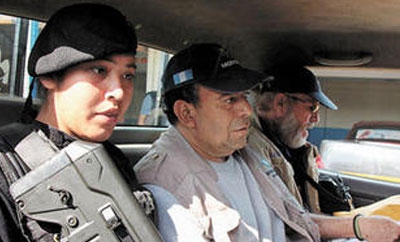El Salvador’s Attorney General’s Office has accused 20 people of links to recently arrested drug trafficker “Repollo,” as a picture emerges of the transnational network run by the Salvadoran “transportista.”
Jorge Ernesto Ulloa Sibrian, who was arrested in Guatemala in March, is the alleged head of a network accused of moving 9.6 tons of cocaine in 22 shipments to the United States between 2005 and 2011. On March 20, a San Salvador court ordered pre-trial detention for Ulloa and 14 alleged accomplices. Six more remain in hiding, reported La Prensa Grafica.
According to Salvadoran authorities, Ulloa used a network of criminal connections stretching from Colombia to Mexico and reaching into every Central American country. His organization included personnel who worked a wide range of jobs, from receiving drug shipments to building secret storage compartments in order to transport the illicit goods. Ulloa’s network even hired women who accompanied men to pick up the drug shipments, to keep up the pretence they were on a family trip. In order to move the drugs by land, Ulloa’s network typically used pickup trucks that had a hidden compartment in the gas tank, with space for up to 25 kilos of cocaine.
La Prensa Grafica reports that two Colombians are believed to be responsible for acquiring the cocaine and smuggling it to Panama, from where Carlos Gomez Figueroa — a drug trafficker arrested in 2011 — would move it by land to Costa Rica. A local criminal group which included corrupt former policemen — including Walter Corea, sentenced for drug trafficking in 2011 — would then move it across the Peñas Blancas border crossing into Nicaragua. The cocaine shipments were then moved onto Honduras, El Salvador, and Guatemala, passing through the hands of various local criminal groups. These include the Alvaritos in Nicaragua and the Los Valle cartel in Honduras — a crime family with links to the Sinaloa Cartel.
Once in Guatemala, Julio Cesar Bonilla Cabrera (who has been arrested and is facing trial), is accused of moving the drugs into Mexico, using contacts with the Sinaloa Cartel.
Ulloa’s network is also believed to have used maritime routes from Costa Rica to El Salvador in order to move cocaine northwards.
InSight Crime Analysis
Central America is of key importance in the drug trade. The US State Department estimates in 2012, 80 percent of cocaine travelling from South America to the US passed first through Central America. The violent Northern Triangle region of Guatemala, El Salvador, and Honduras have long been hubs for “transportista” networks such as Ulloa’s. The breakdown of Ulloa’s organization offered by La Prensa Grafica sheds light on how such networks require a high level of coordination between diverse criminal groups in order to move cocaine shipments to the US.
Ulloa’s case will likely lead to further arrests in the coming months, as well as further revelations about the alliances between Central America’s drug smuggling organizations. As noted by InSight Crime, Ulloa has previously been linked to another major criminal network in the region, Salvadoran group the Texis Cartel.

